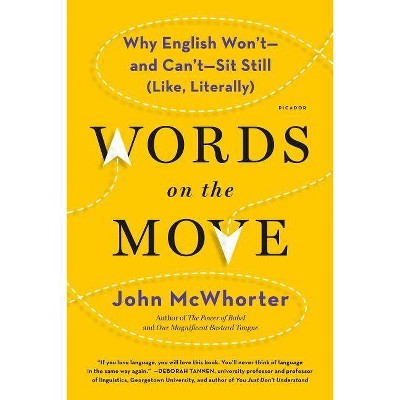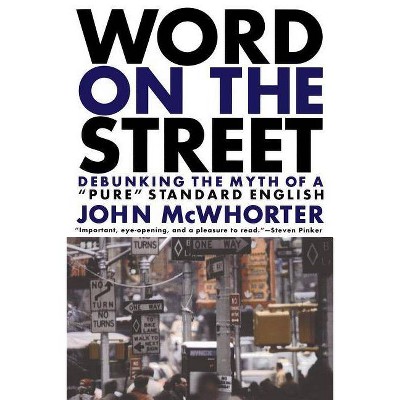Words on the Move - by John McWhorter (Paperback)

Similar Products
Products of same category from the store
AllProduct info
<p/><br></br><p><b> About the Book </b></p></br></br>"A bestselling linguist takes us on a lively tour of how the English language is evolving before our eyes and why we should embrace this transformation and not fight it. Language is always changing -- but we tend not to like it. We understand that new words must be created for new things, but the way English is spoken today rubs many of us the wrong way. Whether its the use of literally to mean "figuratively" rather than "by the letter" or the way young people use LOL and like or business jargon like What's the ask?--it often seems as if the language is deteriorating before our eyes. But the truth is different and a lot less scary, as John McWhorter shows in this delightful and eye-opening exploration of how English has always been in motion and continues to evolve today. Drawing examples from everyday life and employing a generous helping of humor, he shows that these shifts are a natural process common to all languages, and that we should embrace and appreciate these changes, not condemn them. Words on the Move opens our eyes to the surprising backstories to the words and expressions we use every day. Did you know that silly once meant "blessed?" Or that ought was the original past tense of owe? Or that the suffix -ly in adverbs is actually a remnant of the word like? And have you ever wondered why some people from New Orleans sound as if they come from Brooklyn? McWhorter encourages us to marvel at the dynamism and resilience of the English language, and his book offers a lively journey through which we discover that words are ever on the move and our lives are all the richer for it"--<p/><br></br><p><b> Book Synopsis </b></p></br></br><p>Language is always changing, but the way English is spoken today rubs many of us the wrong way. Whether it's the use of literally to mean "figuratively," or the way young people use LOL or business jargon like What's the ask?--it often seems as if the language is deteriorating before our eyes. <p/>But the truth is different and a lot less scary. Drawing examples from everyday life and employing a generous helping of humor, John McWhorter shows that these shifts are common to all languages, and that we should embrace these changes, not condemn them. <p/>He opens our eyes to the surprising backstories to words and expressions we use every day. Did you know that silly once meant "blessed"? Or that ought was the original past tense of owe? Or that the suffix -ly in adverbs is actually a remnant of the word like? <p/>In <i>Words on the Move</i>, McWhorter encourages us to marvel at the dynamism and resilience of the English language, and his book offers a delightful journey where we see that words are ever on the move and our lives are all the richer for it.</p><p/><br></br><p><b> Review Quotes </b></p></br></br><br><p>"John McWhorter's <i>Words on the Move</i> has a deeper point than most language books: it's focused on the ordinary words which do most of the grunt work of communicating, but which we rarely give much thought to. It's full of little puzzles and surprises that stop us in our tracks and make us aware of the gentle breezes that are always blowing our words hither and yon. McWhorter is awfully good at listening to words and at explaining what he hears there, and his book is so brimming with insights that even as a linguist, I found myself stopping every couple of pages to say to myself, 'Huh--I never thought of that.' So will you." <b>--Geoffrey Nunberg, linguist on NPR's "Fresh Air" and author of <i>Going Nucular</i> and <i>Ascent of the A-Word</i></b> <p/>"If you want to hate on new developments in English, you should at least understand why. With a combination of linguistic erudition and ready wit, John McWhorter takes us on a tour of a thousand years of the history of English, showing how language change is natural, unavoidable, and fascinating. You'll come away with a better realization of why you feel the way you do--and why you shouldn't." <b>--</b><b>Jesse Sheidlower, author of <i>The F-Word</i>, former editor at large of the <i>Oxford English Dictionary</i>, and past president of the American Dialect Society</b> <p/>"Witty and wise, John McWhorter's <i>Words on the Move</i> is an adventure and a romp, full of surprises and delights. If you love language, you will love this book. You'll never think of language in the same way again." <b>--</b><b>Deborah Tannen, university professor and professor of linguistics, Georgetown University, and author of <i>You Just Don't Understand <p/></i></b>"An unintimidating welcome to readers new to the subject that pleasantly relaxes the discourse of grammar propriety." <b>--</b><b><i>Publishers Weekly</i></b> <p/>"Fascinating.... McWhorter proves to be a well-informed and cheerful guide to linguistics.... enthusiastically mak[ing] the case that language is fluid."<b>--</b><b><i>Kirkus Reviews</i></b></p><br><p/><br></br><p><b> About the Author </b></p></br></br><b>John McWhorter</b> is an associate professor of English and comparative literature at Columbia University and is the author of <i>The Language Hoax</i>, <i>The Power of Babel</i>, and <i>Our Magnificent Bastard Tongue</i>. He writes for <i>TIME</i>, CNN, <i>The Wall Street Journal</i>, and <i>The Atlantic</i>, and his articles have also appeared in <i>The New York Times</i>, <i>The New Yorker</i>, the<i> </i><i>Los Angeles Times</i>, <i> </i><i>The Washington Post</i>, <i>The New Republic</i>, <i> </i>and <i>The Daily Beast
Price History
Cheapest price in the interval: 14.49 on March 10, 2021
Most expensive price in the interval: 16.99 on November 8, 2021
Price Archive shows prices from various stores, lets you see history and find the cheapest. There is no actual sale on the website. For all support, inquiry and suggestion messagescommunication@pricearchive.us




















